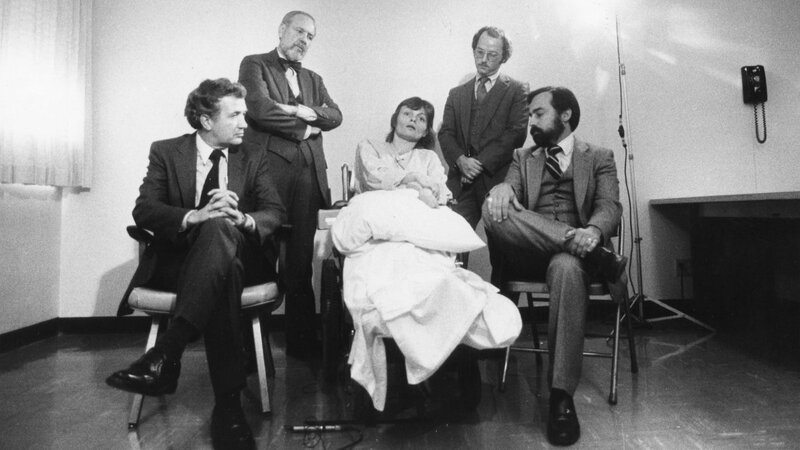
Disability Rights Take Center Stage in a Haunting Reflection
MOVIE REVIEW
Life After
–
Genre: Documentary
Year Released: 2025
Runtime: 1h 39m
Director(s): Reid Davenport
Where to Watch: opening at the Film Forum in NYC on July 18, 2025
RAVING REVIEW: A documentary like LIFE AFTER enters the conversation like a challenge, asking not only whether we value disabled lives, but what it means when society quietly answers “not really.” Directed by Reid Davenport, a disabled filmmaker known for I DIDN’T SEE YOU THERE (another incredible film), this searing, often heartbreaking investigation reexamines the legacy of Elizabeth Bouvia, a disabled woman who, in 1983, became a flashpoint in the national right-to-die debate. But what Davenport uncovers in that legacy isn’t just history—it’s a warning.
Bouvia’s case sparked headlines and lawsuits, yet the public discourse too often flattened her into a symbol, erasing the systems of neglect and humiliation that led her there. Davenport refuses to do that. He pulls the lens back and looks hard at how society treats disabled people today. What emerges isn’t a film about death—it’s a film about the politics of life, and how easily that life becomes negotiable in the eyes of bureaucrats, healthcare systems, and cultural norms.
The documentary’s greatest strength lies in its reframing of the assisted dying issue. Davenport doesn’t oppose bodily autonomy, but he interrogates what kind of “choice” exists in a society that leaves disabled people with few alternatives. With interviews ranging from disability justice activists to doctors, politicians, and those who have faced these decisions firsthand, LIFE AFTER weaves a sobering mosaic of what autonomy looks like when the backdrop is systemic neglect.
LIFE AFTER is unflinching in its analysis. It challenges viewers to consider the moral rot in a system that offers death more efficiently than support. Stories like that of Michal Kaliszan, a disabled Canadian man who contemplated state-sanctioned death because the alternative was institutionalization, are impossible to forget. It isn’t a stretch to see his desperation mirrored in cases across the United States, where gutted healthcare and inadequate home support services leave disabled individuals cornered.
Davenport guides the narrative with personal insight, making it clear that this isn’t just an abstract policy debate—it’s a matter of life and death. His narration is grounded and honest, exposing the double standards baked into how society views suffering. Where able-bodied discomfort is met with empathy, disabled distress is often met with silence, if not open encouragement to give up. Davenport articulates a chilling point: disabled lives are too often seen as already lost.
The film’s visuals are just as powerful, ensuring that the storytelling is both tight and poignant, as it weaves historical footage, court transcripts, and modern testimony into a cohesive whole. But it’s the testimony from those directly affected—Melissa Hickson, whose husband Michael was removed from life support against her wishes; Sarah Jama, who connects Canada’s MAID policy to economic abandonment; and Elizabeth Bouvia’s sisters—that gives the film its moral force. Their words ache with a clarity that cannot be brushed aside.
Still, LIFE AFTER isn’t a debate—it’s an encouragement. It doesn’t present easy answers, nor does it demand one conclusion over another. Instead, it forces the audience to wrestle with what “choice” really means in an unequal society. In this way, it works as both a documentary and a litmus test: do we believe in equality only in theory, or are we willing to confront the policies and attitudes that quietly undermine it every day?
The scope of the issues it tackles—eugenics, healthcare, economic disenfranchisement, autonomy—could easily fill several documentaries, and at times, the transitions between U.S. and Canadian contexts feel blurred. Some viewers may wish for more detailed follow-through on individual cases, especially Bouvia’s, which is introduced as the narrative spine but occasionally gets eclipsed by the wider thematic web. These are minor drawbacks in a film that accomplishes so much with thoughtfulness and power. It just leaves the door open to hear more from an incredible director. I can’t wait to see what Reid Davenport does next!
As LIFE AFTER tells its tale, it becomes clear that the fight for disabled rights is not a past-tense struggle. The film asks: if we claim to care about dignity, equity, and justice, why are disabled people so often the exception? It is not just about Elizabeth Bouvia—it is about everyone who has been told that survival is too expensive, care is too inconvenient, and existence is optional.
This is a documentary that should be required viewing for anyone who believes in social justice. Davenport doesn’t just make the case for disabled lives—he demands we look at the infrastructure of ableism that dictates who gets to live with support, and who is encouraged to go away. With its interviews, poignant storytelling, and undeniable urgency, LIFE AFTER is a wake-up call.
And it’s long overdue.
Please visit https://linktr.ee/overlyhonestr for more reviews.
You can follow me on Letterboxd, Instagram, Twitter, and YouTube. My social media accounts can also be found on most platforms by searching for ‘Overly Honest Reviews’.
I’m always happy to hear from my readers; please don’t hesitate to say hello or send me any questions about movies.
[photo courtesy of MULTITUDE FILMS, SUNDANCE INSTITUTE]
DISCLAIMER:
At Overly Honest Movie Reviews, we value honesty and transparency. Occasionally, we receive complimentary items for review, including DVDs, Blu-rays, CDs, Vinyl Records, Books, and more. We assure you that these arrangements do not influence our reviews, as we are committed to providing unbiased and sincere evaluations. We aim to help you make informed entertainment choices regardless of our relationship with distributors or producers.
Amazon Affiliate Links:
Additionally, this site contains Amazon affiliate links. If you purchase through these links, we may receive a commission. This affiliate arrangement does not affect our commitment to honest reviews and helps support our site. We appreciate your trust and support in navigating these links.



Average Rating